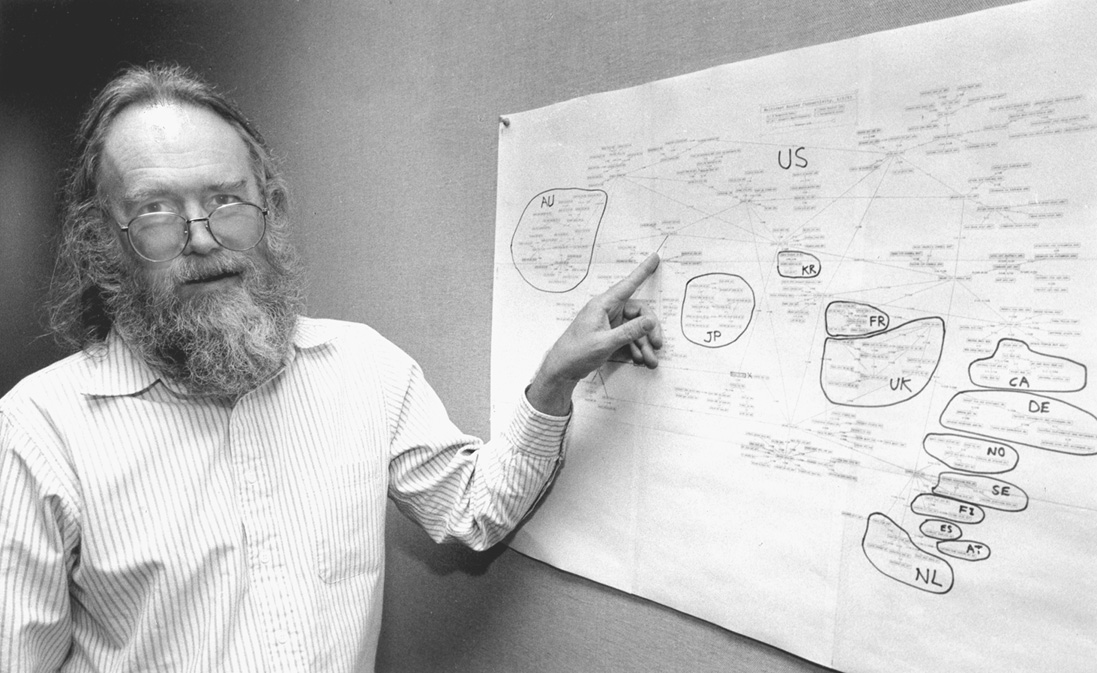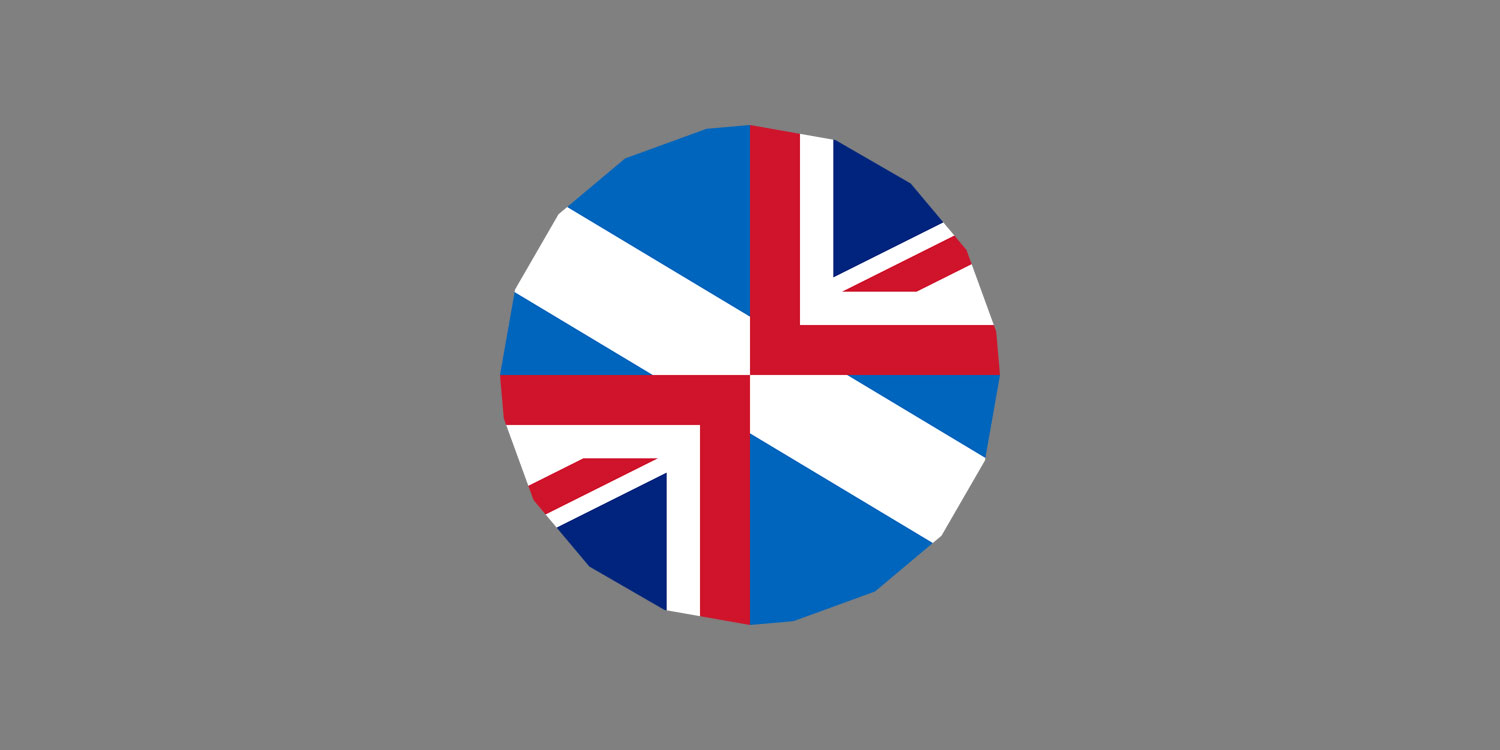In the early days of the internet, long before the World Wide Web, the first computers which talked to each other over long distances had numbers instead of names. Instead of the "www..." we type today, they used an IP address, something like "123.45.67.89". As the network grew, the number of computers increased and came together in clusters, and many of the new users weren’t engineers. As a result, a new system was needed for naming computers, which everyone could use. What was introduced in 1983 was called DNS, for Domain Name System, and is still in use today.
DNS works by translating words into IP addresses. The numbers are still there, they’re just hidden behind the words, and the words have meaning too. Alongside a handful of "generic top-level domains" (gTLDs), like .com, .org, and .net, it was decided that the system should reflect the location of computers as well. In 1985, the very first Country code top-level domains (ccTLDs) were registered: .us for the United States, .uk for the United Kingdom, and .il for Israel. .au, .de, .fi, .fr, .jp, .kr, .nl and .se followed in 1986. Today, some 270 ccTLDs exist: one for every recognised country on earth.

That recognised is key. DNS was the invention of a handful of computer scientists connected to the University of Southern California, and its implementation and the subsequent creation of the domains themselves was led by Jon Postel (above, in 1994, with map of Internet top-level domains). Postel handed out the domains on what was essentially a first-come, first-served basis, in a system that wasn’t fully codified for years. This approach was to cause problems in the future - and some of these are discussed in other domain stories - but one early decision stuck: to decide what counted as a country for the purposes of assigning it a domain name, Postel used ISO 3166-1, a list of countries published by the International Standards Organisation and supported by the United Nations. If you were on the list, you got a domain, and if you weren't you didn't - at least until recently.
So what about unrecognised, emergent, and perhaps future independent nations? What does it mean to gain a domain name, and what is its effect both in the world, and on the web? This story is about how you get a country-level domain name, and what the implications might be.
In 2009, a group of Scottish businesspeople started lobbying for a top-level domain for Scotland, with the support of the Scottish government, cultural bodies, business, individuals, and Scottish associations in the diaspora. According to Harry McGrath, chair of the Dot Scot registry, ".scot originated in the idea that people, organisations and businesses should have the opportunity to clearly identify themselves as Scottish and the fact that it would provide a branding tool for businesses and a clear cultural identifier for people in Scotland and in the wider Scots diaspora."
For five years, the not-for-profit Dot Scot campaign lobbied ICANN, the Internet Corporation for Assigned Names and Numbers. Although there is now an acceptance of a far wider list of domain names than just the original gTLDs and the ISO countries, ICANN still required letters of support from government and cultural bodies, as well as businesses and individuals with a connection to Scotland. While the UK government supplied a "letter of non-objection", the Scottish government was strongly in support - and just a few months after the domain was granted in 2014, the Scottish government moved its own domain to gov.scot, following the UK government’s use of gov.uk.
Today, .scot is growing rapidly, both in Scotland and internationally. During the Scottish Independence Referendum in September 2014, which saw a vote across the country to decide whether to stay in or to leave the United Kingdom, both sides of campaign used .scot websites for their online platforms. But while that referendum preserved the union, future political events could mean that the choice of a .scot over a .uk website is more than a cultural one.

Every country-code domain has a registry: the list of websites under that domain, and that register is required to be based, at least for administration purposes, in the country which it relates to. As a result, content on these websites is subject to the laws of the country it's registered in: even if a government can’t remove the actual data from a website, which may be anywhere in the world, they can revoke the domain name, so nobody can find the website at that address anymore.
If Scotland were to separate from the UK, the .scot domain would not only become the top-level domain for the newly-independent country, it would be subject to Scottish, rather than British law - and so would the contents of .scot websites.
One of the most controversial uses of the UK’s Human Rights Act, a piece of legislation from 1998, which brought the UK into line with European Human Rights laws, has been the creation of a de facto right to privacy. Unlike much of Europe, Britain has not historically had strong privacy laws - hence the international notoriety of its tabloid press. But since the implementation of the act, celebrities and convicted criminals alike have successfully kept themselves out of the papers using the act’s assertion of the right to privacy. It has also been invoked in terrorism trials, planning appeals, and medical cases.
In the 2015 British General Election, the Conservative Party, which went on to win the election, promised that it would repeal the Human Rights Act. The Scottish Government, based in Edinburgh, has declared itself against any such move, as has the Scottish National Party, which won fifty-six seats in the UK parliament in the same election.
Any disagreement might prevent the repeal - or provide the spur for further separation, leading, ultimately, to different laws on either side of the border. What is permissible to write or share on a webpage might be different in London and Edinburgh. Different sites, different countries, different rights: this is one of the many ways citizenship, politics, and the internet are deeply and inextricably intertwined.